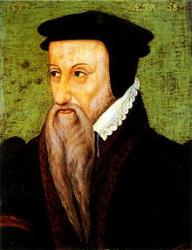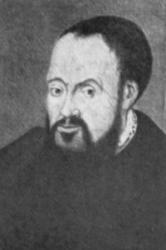Planning worship?
Check out our sister site, ZeteoSearch.org,
for 20+ additional resources related to your search.
- |
User Links
Person Results
Norman J. Kansfield
b. 1940 Person Name: Norman Kansfield, 1940- Paraphraser of "Great God, arise" in The Book of Praise
Norman J. Kansfield
Johannes Zwick
1496 - 1542 Author of "O Gott und Vater gnadenvoll" in Evangelisches Kirchengesangbuch Zwick, Johann, son of Conrad Zwick, Rathsherr at Constanz, was born at Constanz, circa 1496. He studied law at the Universities of Basel, Freiburg, Paris, and Padua (where he graduated LL.D.), and was for some time a tutor in law at Freiburg and at Basel. In 1518 he entered the priesthood, and in 1522 was appointed parish priest of Riedlingen on the Upper Danube. Being accused of Lutheran tendencies, he was forbidden in 1523 to officiate, and in 1525 his living was formally taken from him. He returned to Constanz, and was appointed by the Council in 1527 as one of the town preachers. Here he laboured unweariedly, caring specially for the children, the poor, and the refugees, till 1542. In Aug. 1542, the people of Bischofszell, in Thurgau, having lost their pastor by the pestilence, besought Constanz to send them a preacher; and Zwick, proceeding there, preached and visited the sick till he himself fell a victim to the pestilence, and died there Oct. 23, 1542 (Koch, ii., 76; Herzog's Real-Encyklopädie, xvii. 578, &c).
Zwick was one of the leaders of the Swiss Reformation. He ranks next to Blaurer as the most important of the early hymnwriters of the Reformed Church. His hymns are collected in Wackernagel, iii., Nos. 672-696. The best appeared in the Nüw gsangbüchle von vil schönen Psalmen und geistlichen liedern, published at Zurich, 1536 (2nd edition 1540 is the earliest now extant), of which he was the chief editor, and which was the first hymn-book of the Reformed Church.
The only hymn by Zwick which has passed into English is:—
Auf diesen Tag so denken wir. Ascension. This probably appeared in the Nüw gsangbüchle, Zürich, 1536; and is certainly in the 2nd ed. of 1540, from which it is quoted In Wackernagel, iii. p. 608, in 5 stanzas of 7 lines, with "Alleluia." It is also in (2) the Strassburg Psalmen und geystliche Lieder, 1537, f. 99b, and in (3) S. Salminger's (J. Aberlin's?) Der gantz Psalter, &c.(Zürich?), 1537, f. 146 [British Museum]. In each case it is entitled "Another hymn on the Ascension of Christ," while in 1540 the first line is given as "Uff disen tag so dencken wir," in 1537 (2) as "Uf disen tag so dencken wir," and in 1537 (3) as "Auff disen tag so dencke wir." It is the finest of Zwick's hymns, and its spirit of joyful faith, its conciseness, and its beauty of form, have kept it in use among the Lutherans as well as among the Reformed. It is No. 153 in the Unverfälschter Liedersegen, 1851. The translations are:—
1. Raise your devotion, mortal tongues.
2. To-day our Lord went up on high. By Miss Winkworth, omitting stanza iii., in her Lyra Germanica 2nd Ser., 1858, p. 46. Repeated in Schaff’s Christ in Song, 1869 and 1870, and the Schaff-Gilman Library of Religious Poetry, 1881.
3. Aloft to heaven, we songs of praise. This is a free translation, in 4 stanzas of 6 lines, by Dr. G. Walker, in his Hymns from German, 1860, p. 30. [Rev. James Mearns, M.A.]
-- John Julian, Dictionary of Hymnology (1907)
Johannes Zwick
Théodore de Bèze

1519 - 1605 Person Name: Théodore de Béze Author of "Que Dieu se montre seulement" in Cantate Domino Bèze, Théodore de, born at Vezelay, in Burgundy, 1519; died 1605. Bèze’s father was of noble birth. He occupied the post of bailiff at Vezelay. Bèza received a first-rate classical education under Melchior Wolmar. Before he was 20 he wrote some poetry in imitation of Catullus and Ovid, the licentiousness of which he mourned and condemned in alter years. A brilliant prospect of Church emoluments turned his attention from the distasteful study of law. The income of the Priory of Longjumeau made him rich, and he became a prominent member of the literary world at Paris. But his entrance into Orders was barred by a secret marriage with Claudine Denosse. Subsequently, when the offer of the abbey of Froidmont by his uncle made it necessary for him to decide between avowing his marriage and renouncing the prospect, or repudiating his wife, he decided, under the solemn conversion produced by a dangerous illness, to abandon the Roman Church, and break with his whole past life. He left for Geneva (1548), and there publicly married. His first scheme for a living was to join his old comrade Jean Crespin, then at Geneva, in printing; but his appointment to the Professorship of Greek at Lausanne (1549), left the printing office in the hands of Crespin. Before his departure fiom Geneva ho had been on intimate terms with Calvin; and the discovery of a metrical rendering of Ps. 16 on Beza's table at Geneva led Calvin to suggest to him the completion of Marot's Psalms. At Lausanne he became a friend of Viret. He stayed there ten years, during which he wrote a tragi-comedy, and 40 of his metrical Psalms (36 published in 1551, 6 more in 1554). He had whilst at Lausanne a narrow escape from death by the plague. In 1557 he went with Karel and Budams to ask for the intercession of the German Protestant Princes in behalf of the persecuted Hugue-nots, and had interviews with Melanchthon. In 1559 he was appointed pastor at Geneva, Assistant Professor of Theology to Calvin, and the first Rector of the newly founded College of Geneva. With Peter Martyr and others he represented the Huguenots in the conference with the Queen-Mother and Cardinal Lorraine, at Poissy (1561), and remained at Paris nearly two years afterwards. His French metrical Psalter, in continuation of Marot, was completed in 1562. Calvin's death, 1564, left Beza the foremost figure at Geneva. In 1571, at the summons of the King of Navarre, he presided at the Synod of the Reformed Churches at Rochelle; and again (1572) at Nismes. His wife died in 1588, and he married again soon afterwards. His public life, as a theologian, a preacher, and administrator, ceased about 1598, though he preached again for the last time in 1600. He was honoured till his death; only three years before which the Landgrave of Hesse visited him, when passing through Geneva. The works of Beza are very numerous. As a controversialist, a commentator, an investigator of the text of the New Testament, he occupied a high place in his time. Among his chief works are: Annotationes in N. T.., 1556; Novum Testamentum, 1556; Psalms, with paraphrase in Latin, 1579; Life of Calvin, 1563. [Rev. H. Leigh Bennett, M.A.]
-- John Julian, Dictionary of Hymnology (1907)
Théodore de Bèze
Clément Marot

1496 - 1544 Person Name: Clement Marot Author of "Eternel, ta fidélité" in Cantate Domino Born: About 1497, Cahors, France.
Died: August 1544, Turin, Italy.
At age 16, Marot became a page to Nicolas de Neufville, and at age 21 Valet de Chambre to Marguerite de Valois. He later fought at Pavia, where he was wounded and taken prisoner with Francis I. From 1537-9 he translated about 30 psalms, which were published in 1542. He traveled widely, sometimes fleeing persecution, and stayed at various times in Savoy, Geneva, and Turin.
Sources:
Julian, p. 714
Lyrics;
Rendez à Dieu Louange et Gloire
© The Cyber Hymnal™ (hymntime.com/tch)
Clément Marot
Johann Christoph Hampe
Translator (German) of "Que Dieu se montre seulement" in Cantate Domino
Johann Christoph Hampe
Robert Campen
Author of "Give thanks to God, call on his name" in Praise! psalms hymns and songs for Christian worship
Robert Campen
Margaret House
Translator (English) of "Que Dieu se montre seulement" in Cantate Domino
Margaret House
Valentin Conrart
1603 - 1675 Person Name: Conrart Alterer of "Que Dieu se montre seulement" in Cantate Domino
Valentin Conrart


 My Starred Hymns
My Starred Hymns


